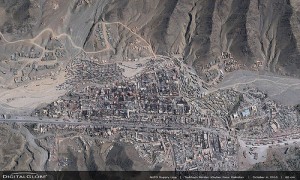With US-Pakistan Relations Nearing Tipping Point Again, Watch the Border Crossings
When NATO forces killed 24 Pakistani soldiers in November of 2011, Pakistan retaliated by closing both of its border crossings into Afghanistan. They remained closed until then-Secretary of State Hillary Clinton issued an apology in July of 2012. Perhaps because that action by Pakistan stands out as one of the few times Pakistan has had a bit of an advantage in dealing with the US, Imran Khan, whose PTI political party controls the government in Khyber Pakhtunkhwa province, has called for the closing of the Khyber Crossing in retaliation for the drone strike that killed Hakimullah Mehsud. Khan blames the strike for derailing for now the budding peace talks between Pakistan’s government and the Pakistan Taliban.
Yesterday, Khan provided a bit of room for maneuvering, and gave until November 20 for US drone strikes to end in Pakistan before closing the crossing:
Taking yet another staunch stance, Pakistan Tehreek-e-Insaf (PTI) Chairman Imran Khan on Monday announced to extend the deadline for blocking NATO supply lines across Khyber Pakhtunkhwa Province (KP) for 15 days in respect of Moharram, asking the US administration to stop drone strikes inside Pakistan or deal with the blockade of supply lines.
In passionate speech in the NA, Khan said the KP government would suspend the supply line on November 20, urging Prime Minister Nawaz Sharif to seek guarantee from America that no drone strike would jeopardise future peace talks with the Taliban.
Some PML-N leaders, however, termed the change in mood of Khan and the postponement of deadline to cut NATO supply line a result of backchannel contacts with Khan by Interior Minister Nisar Ali Khan. They said Nisar had saved Khan and his party’s government from a head-on clash and tensions would decline as peace talks may soon be “back on track”.
So while there may be a cooling off period before closing the Khyber Crossing, there are a number of incidents to report in the vicinity of the southern crossing at Chaman. First, Pakistan Today noted that a US drone crossed into Pakistani air space at the crossing on Monday:
An American drone violated Pakistan’s airspace by 300 meters on Monday. Security sources said the drone, controlled from US base of the Afghan Qarahag district, entered Pakistani airspace at 6am and returned after flying over the city for five hours.
This is far from the tribal area where US drones hover nonstop. The article went on to state that the last time a drone had crossed the border at this location was three weeks ago.
Ah, but it appears that the drone missed its likely target by a day. There was a suicide bombing from the Afghan side of the crossing today: Read more →


